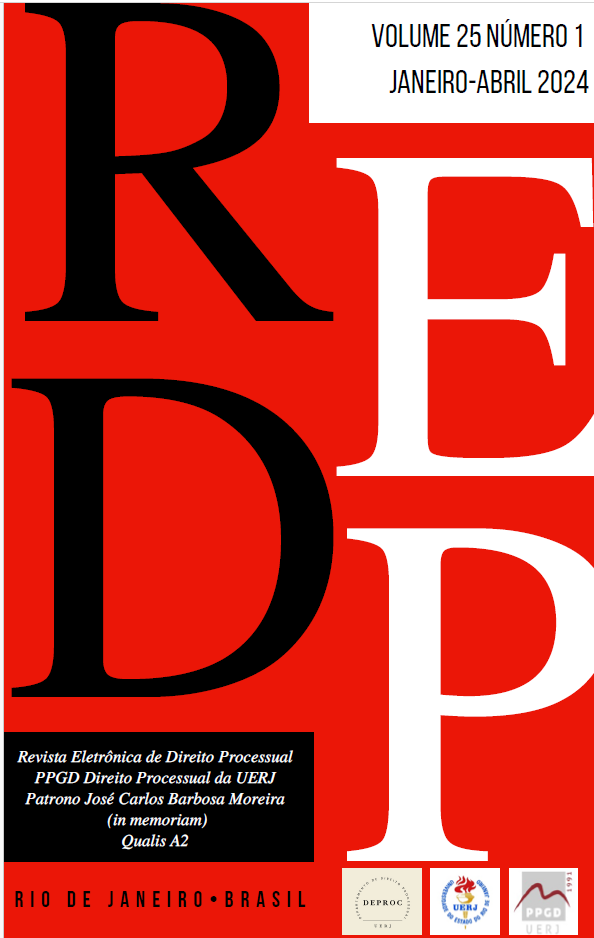PRINCIPAIS DESAFIOS PARA A UTILIZAÇÃO DA ARBITRAGEM PELO PODER PÚBLICO
DOI:
https://doi.org/10.12957/redp.2024.81916Resumo
Atualmente, não há mais qualquer dúvida sobre a admissibilidade da participação da Fazenda Pública em arbitragem, uma vez que a própria lei da arbitragem o permite. O problema atual é diverso e envolve a identificação dos desafios para a utilização desse outro meio de resolução de conflitos, diante das peculiaridades do regime jurídico do poder público. Vários entes públicos já regulamentaram diversos aspectos para sua utilização, sendo um importante ponto de partida para qualquer discussão sobre o tema, motivo pelo qual muitos desses regulamentos são mencionados durante o texto. O objetivo do artigo é o de identificar e enfrentar as especificidades do regime da arbitragem que envolva a Fazenda Pública. A primeira questão é sobre o conceito de direito patrimonial, buscando identificar em quais hipóteses é possível que haja possibilidade de utilização da arbitragem, partindo de diversos exemplos expressamente mencionados pela legislação. Além disso, também é importante identificar qual a autoridade, dentro da burocracia estatal, com o poder de celebrar esse contrato, de forma a evitar futuras alegações de nulidades. Há também de se identificar alguns limites ao regime da arbitragem com o poder público, diante da exigência de publicidade – como regra – e de que esta seja feita de acordo com o direito, vedada a equidade. Outra dificuldade existente envolve o procedimento a ser utilizado, se ela será institucional ou ad hoc, sendo evidente a preferência pela primeira e a escolha dos árbitros. Por mais que não se possa exigir procedimento licitatório, estes devem ser escolhidos a partir de critérios transparentes. Por fim, enfrenta-se o delicado tema da forma de pagamento da sentença desfavorável ao poder público, se ele pode ser realizado diretamente a partir do orçamento ou se há exigência de utilização do precatório. Por conta da exigência constitucional de utilização do precatório para pagamento de sentenças judiciais proferidas contra a Fazenda Pública e sendo a arbitragem uma forma de exercício de jurisdição, não há como escapar dessa forma obrigatório de pagamento.
Downloads
Publicado
Como Citar
Edição
Seção
Licença
Copyright (c) 2024 Ravi de Medeiros Peixoto, Murilo Avelino

Este trabalho está licenciado sob uma licença Creative Commons Attribution 4.0 International License.
Todos os artigos publicados na Revista Eletrônica de Direito Processual (REDP) (Departamento de Direito Processual, Universidade do Estado do Rio de Janeiro, Brasil) são licenciados por meio de uma Licença Creative Commons - Atribuição 4.0 Internacional (CC BY 4.0).
Os autores retêm os direitos autorais de seu artigo e concordam em licenciar seu trabalho com a licença CC BY 4.0, aceitando assim os termos e condições específicos desta licença disponíveis no seguinte website: https://creativecommons.org/licenses/by/4.0/legalcode.
- Os autores concedem à REDP o direito de primeira publicação, de se identificar como publicadora original do trabalho e concedem à revista uma licença de direitos não exclusivos para utilizar o trabalho das seguintes formas: Reproduzir, vender e distribuir cópias eletrônicas ou impressas do manuscrito como um todo, de partes específicas do manuscrito e de suas traduções para qualquer idioma;
- O uso do artigo por terceiros é livre, contanto que a integridade da publicação seja mantida e seus autores originais, periódico de primeira publicação e detalhes de citação sejam identificados.
Dentro dos termos da licença, os autores podem entrar em acordos contratuais adicionais separados para a distribuição não exclusiva da versão publicada do trabalho na revista.
Copyright and Licensing
All articles published in the Procedural Law Electronic Review (REDP) (Department of Procedural Law, State University of Rio de Janeiro, Brazil) are licensed under a Creative Commons License - Attribution 4.0 International (CC BY 4.0).
- Authors retain copyright to their article and agree to license their work under the CC BY 4.0 license, thereby accepting the specific terms and conditions of this license available at the following website: https://creativecommons.org/licenses/by/4.0/ legal code.
- Authors grant REDP the right of first publication, to identify itself as the original publisher of the work, and grant the journal a non-exclusive license to use the work in the following ways: Reproduce, sell and distribute electronic or printed copies of the manuscript as a whole, of specific parts of the manuscript and its translations into any language;
- Use of the article by third parties is free, as long as the integrity of the publication is maintained and its original authors, first publication journal, and citation details are identified.
Within the terms of the license, authors may enter into separate additional contractual agreements for the non-exclusive distribution of the published version of the work in the journal.




